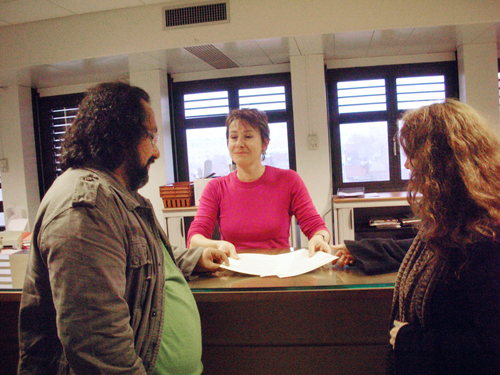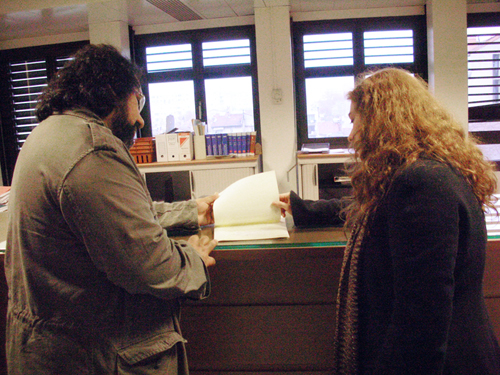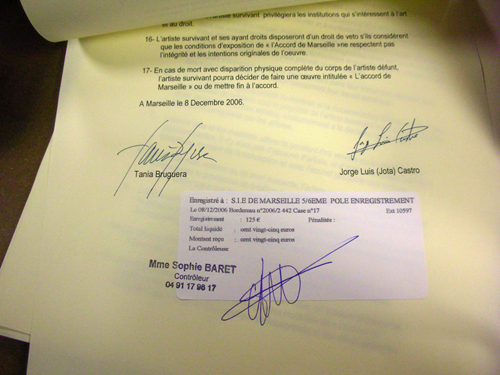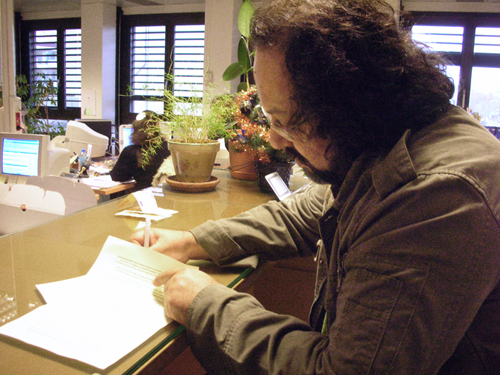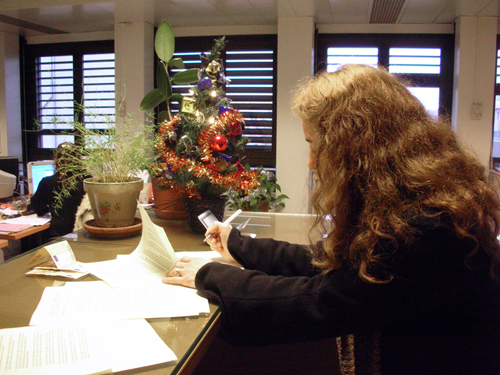Title: L’accord de Marseille [The Marseilles Agreement]
Collaborator: Jorge Luis (Jota) Castro
Year: 2006
Medium: Legal agreement
Materials: Lawyer, Notary, Payment for services, Legal agreement
Certified edition of the legal agreement: three and one artist proof per artist (one was stolen when the project was presented in Marseille)
Statement
L’ accord de Marseille [The Marseilles Agreement] is a work made in collaboration by artists Tania Bruguera and Jota Castro, who have signed a notarial agreement establishing that when one of them dies, the survivor will make a performance with the dead body of the deceased. The piece may exist in several forms: a legal contract, a public presentation with a question and answer period and the future performance as the result of the collaboration.
The Marseille Agreement blurs the limits between art and life, an individual contingency in which the body is offered as a repository of art. Art is created and made after death itself. The body of the artist becomes an object of the public sphere.
Note:
The document, when exhibited, is displayed on a 31″ x 27″ x 94″ wood table in a glass showcase. Xerox copies of the document placed on a side of the table may be taken by the audience.
Exhibited
| 2013 | |
|
Persona Ficta. Hessel Museum of Art, Center for Curatorial Studies Hessel Museum of Art, Bard College, Annandale-on-Hudson. New York, United States. Curated by Cora Fisher. (catalogue) March 24 – May 26 |
|
| 2010 | |
|
Tania Bruguera: On the political Imaginary(Survey Show).Neuberger Museum of Art, Purchase College, State University of New York. Purchase New York, United States. Curated by Helaine Posner. (catalogue) January 28 – April 11 |
|
| 2006 | |
|
I like politique and politique likes me.Triangle France, Montévidéo. Maseilla. Curated by Sandra Patron. December 8 |
Documentation
Scrolldown for CONTRACT, TRANSCRIPTION and IMAGES
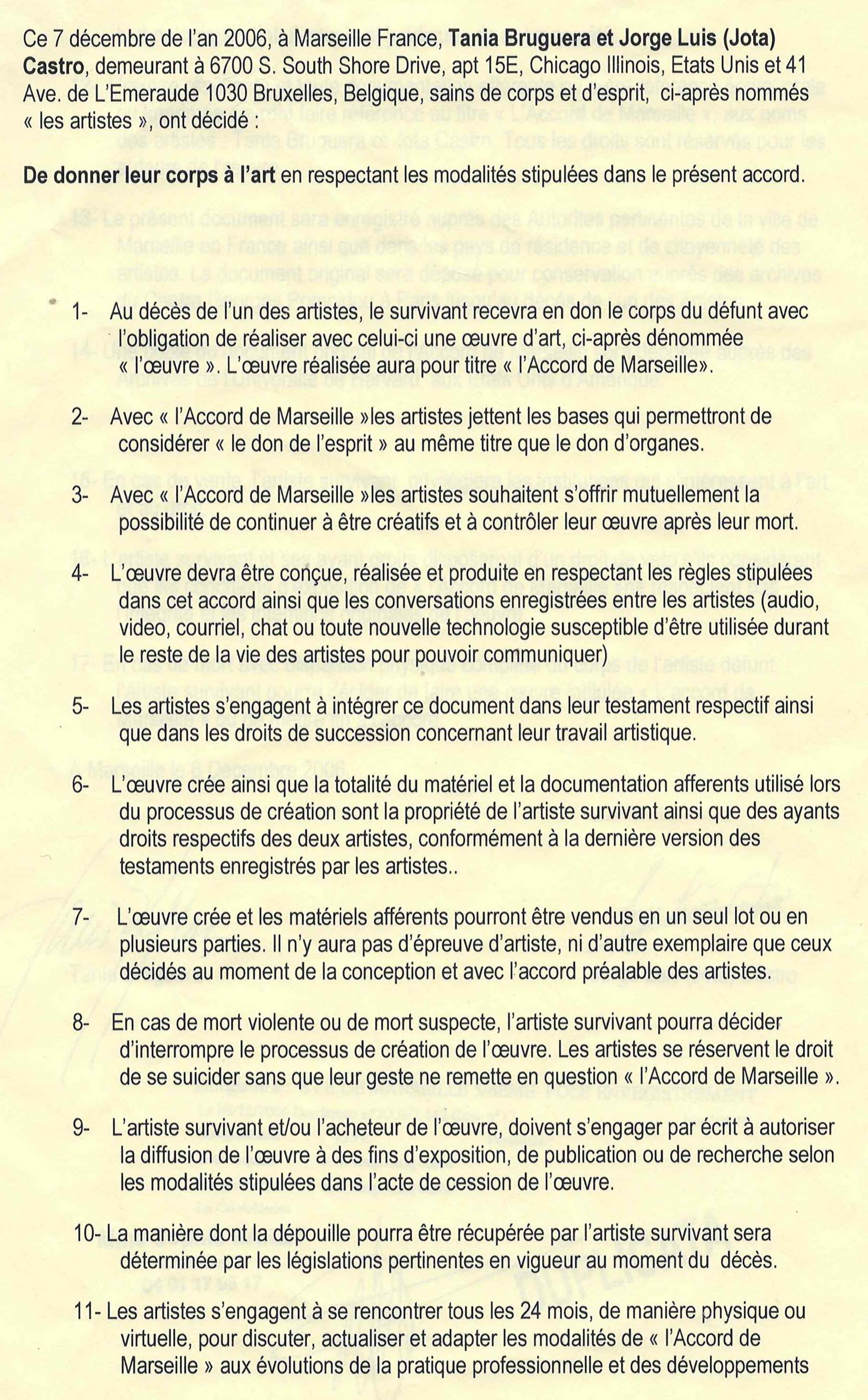 |
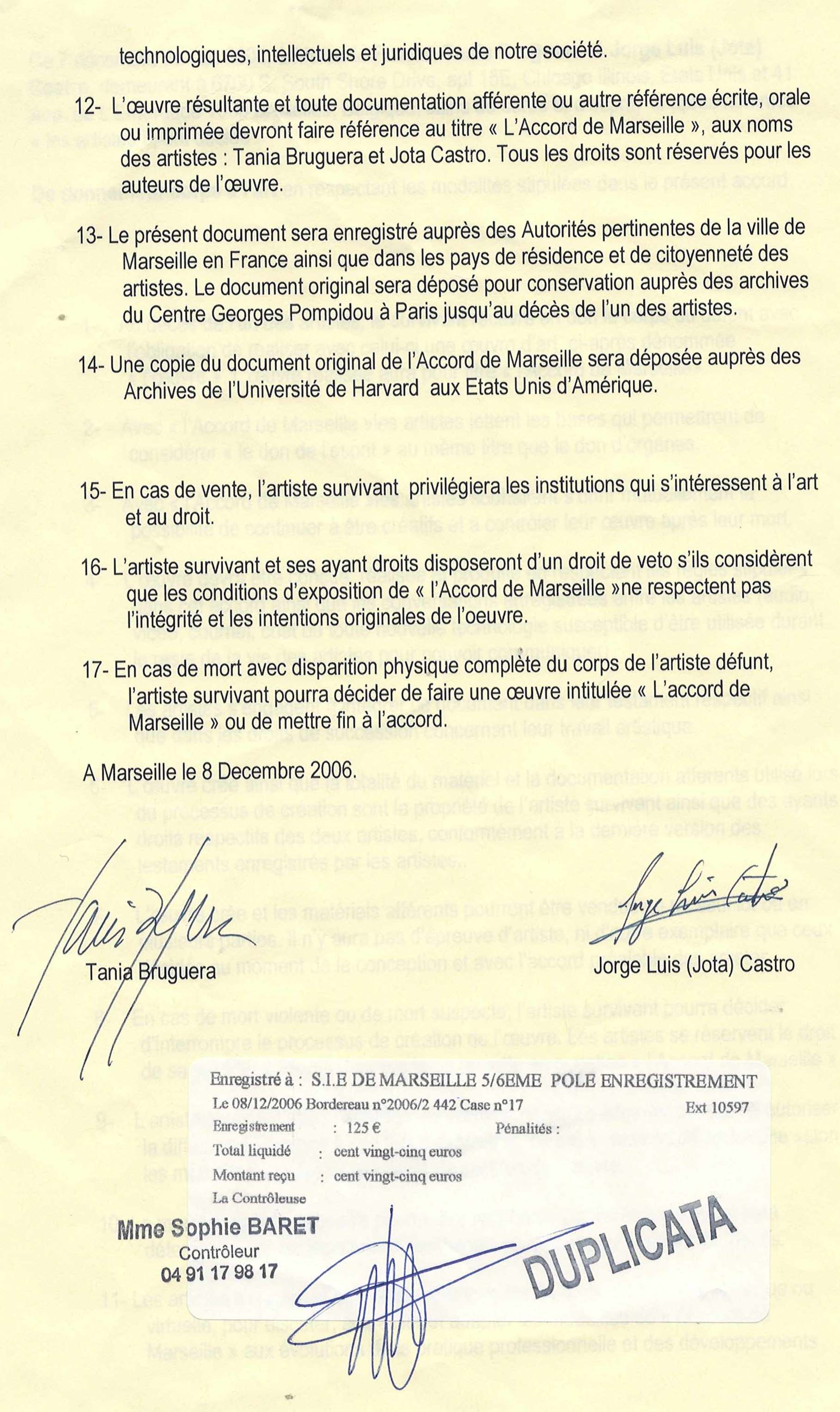 |
On this December 7, 2006, in Marseilles (France) Tania Bruguera and Jorge Luis (Jota) Castro, residents in 6700 S. South Shore Drive, apt. 15E, Chicago, Illinois (United States of America) and 41 Ave. de l’Emeraude 1030, Brussels (Belgium), in full possession of their physical and mental faculties, hereinafter and to the effects of the present contract “the Artists”, decide:
To hand over their body to art respecting the modalities stipulated in the present agreement.
- In case of the demise of one of the artists, the surviving one will receive as a donation the body of the deceased with the obligation of making a work of art with it, hereinafter “the work.” The work made will be entitled “Marseilles Agreement.”
- With the “Marseilles Agreement,” the artists set the basis that will allow that the “donation of the spirit” be placed on the same level of the donation of organs.
- With the “Marseilles Agreement,” the artists wish to offer each other the possibility of continuing being creative and controlling their work even after death.
- The work should be conceived, made and produced respecting the rules of the present agreement and the recorded conversations between the artists (audio, video, e-mail, chats or any new technology that may be used as a means of communication during the rest of the artists’ lives).
- The artists undertake to include the present document in their respective wills, as well as the inheritance rights on their artistic work.
- The creative work, as well as the relevant material and documentation used in the creation process, will be the property of the surviving artist and of the respective rightful claimants of both artists, in agreement with the last version of the wills inscribed by the artists.
- The work created and its related materials may be sold in a single lot or in various ones. There will be no first copy or any other copy than those decided in the moment of conceiving the work and with previous agreement by the artists.
- In case of violent or suspicious death, the surviving artist may decide to interrupt the process of creation of the work. The artists reserve the right of committing suicide without their gesture putting “The Marseilles Agreement” into question.
- The surviving artist and/or the buyer of the work should commit itself in writing to authorize its diffusion, so the work can be exhibited, published or studied in accordance with the deed of assignment of the work.
- The form in which the mortal remains will be recovered by the surviving artist will be determined by the relevant laws in place in the moment of the demise.
- The artist undertake to meet every 24 months, physically or virtually, to discuss, update and adapt the modalities of “The Marseilles Agreement” to the evolution of professional practice and the technological, intellectual and legal development of our society.
- The resulting work, as well as any document related with it or other written, oral or printed reference, should mention the title “The Marseilles Agreement” and the names of the artists Tania Bruguera and Jota Castro. All rights of reproduction are the property of the authors.
- The present document will be registered before the relevant authorities in the city of Marseilles (France) as well as in the countries of residence and citizenship of the authors. The original document will be deposited for preservation in the archives of the George Pompidou Center in Paris until de demise of one of the artists.
- A copy of the original document of The Marseilles Agreement will be deposited in Harvard University (United States of America)
- In case of sale, the surviving artist will favor institutions interested in art and law.
- The surviving artist and his or her rightful claimants will have the right of veto in case they consider the conditions of the exhibition of “The Marseilles Agreement” do not respect the integrity and original purposes of the work.
- In case of death and physical disappearance of the body of the deceased artist, the surviving artist may make a work with the title of “The Marseilles Agreement” or put an end to the agreement.
Given in Marseilles, December 8, 2006
Illegible signature
Tania Bruguera
Illegible signature
Jorge Luis (Jota) Castro
The seal reads:
Registered in S. I. E IN MARSEILLES 5/6th REGISTRY
08/12/2006 Receipt No. 2006/2 442 Case No. 17
Ext 10597
Inscription: 125 € Fines:
justify;”>Amount paid: one hundred twenty five euros
Amount received: one hundred twenty five euros
Ms Sophie BARET
Controller
04 91 17 98 17
Signature: Illegible
DUPLICATE
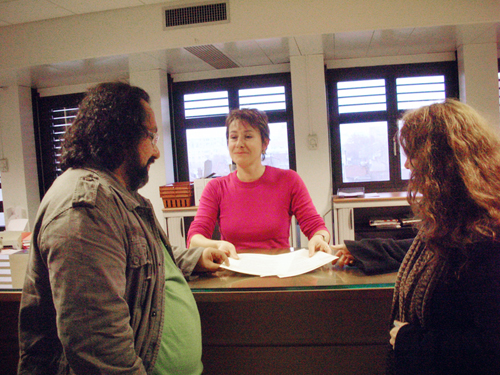 |
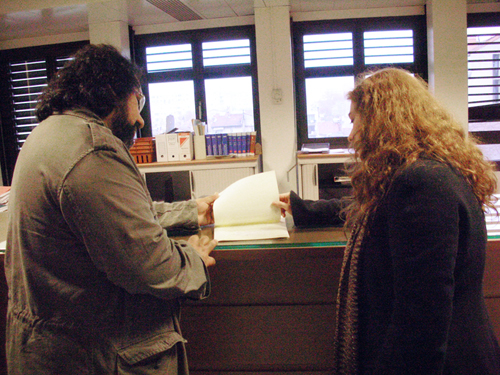 |
||||||
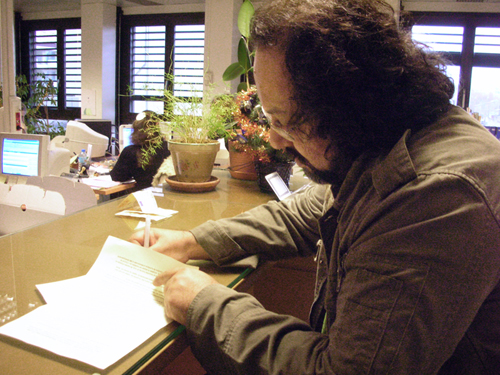 |
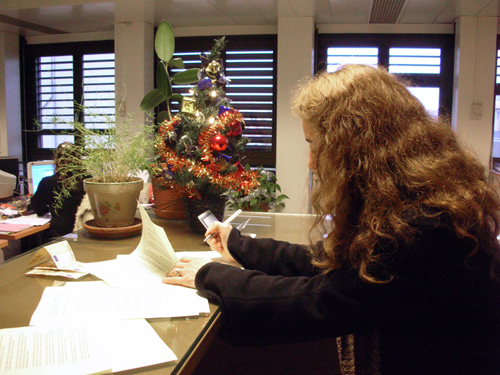 |
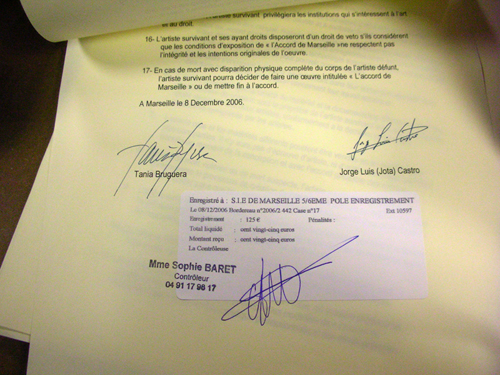 |
S.I.E.
Marseilles, France
Photos: Sandra Patron
Bibliography
(Selection by alphabetical order)
Díaz Guardiola, Javier “Tania Bruguera: “To provoke is not a strategy,” March, 2010. ABC Magazine, Cultural Section, pp.26-27 (illust.)
Pérez Rementería, Dinorah “Performance: An Open Heart Operation On Selected Works by Tania Bruguera,” Art Nexus, No. 70, vol. 7, September-October, 2008, (illust.) pp.94-99.
Posner, Helaine “Introduction: Tania Bruguera: On the political imaginary,” Ed Charta, Milano, Italy, 2009, (illust.)pp.15-21. ISBN 9788881587643
Quotes
“…With Jota Castro, Bruguera signed the Marseille Agreement, one of her most recent work, in which each artist agreed to donate his or her body to the other in the event of death. Bruguera works with the rumors generated around the action undefined sites of resistance, nonconformity, struggle, hesitation, or tolerance like the way she forces those who do not want soup to drink three cups. The artist gives her public an opportunity to express their suspicions without reserve: to belie, reject, and conjecture about the notoriety achieved by the conception or adaptation of her works. She offers her body her work’s conceptual body for us to operate on, to cut up, and to collaborate with, consciously or not, in its implementation”.
Dinorah Pérez Rementería, Art Nexus, No. 70, vol. 7, September-October, 2008
“…In 2006, Bruguera signed a notarized agreement with artist J. Castro called L’accord de Marseille starting that when one of them dies, the other will present a performance using his or her dead body. The work may take several forms including a collaboration, a legal agreement, a public question and answer session, an object to be displayed in a museum, and the performance itself. It also poses a number of important questions, first and foremost: “What is art?” Like much of Bruguera’s work, the accord blurs the boundaries between art and life, here in an extreme way. L’accord de Marseille also tests another limit: that of the personal body as repository of art and site of social critique, converting the artist’s body into a legal body within the public sphere. Tania Bruguera’s art traces a remarkable course that begins with her body and personal experience, goes on to explore the greater political and communal body, and encourages us to consider individual responsibility within a global context. Her journey has taken her from the Cuban themed body performances of the 1990s, through a series of major performances/installations that look at the social and political implications of such charged international sites as Havana, Kassel, Moscow, and Palestine to a new form called Arte de Conducta or behavior art, in which she stages live events meant to activate and engage viewer response. Throughout her work, she has used her Cuban experience of cultural displacement and marginality as a prism through which to examine the mainstream and the individuals’ often difficult relationship to power. She credits her teacher, the acclaimed Cuban artist Juan Francisco Elso Padilla (1956-1988), with providing inspiration for her work, stating:I took from him the idea that art had to be completely linked with life- and not a fiction or a virtual reality, but as alive as possible. My art has to have a real function for myself, to heal my problems or to help other people to reflect and improve . . . For Bruguera, art serves as testimony, as social commitment, and as emotional experience, and is, foremost, ethical at its core.”
Helaine Posner: “Tania Bruguera:On the political imaginary,” Survey Catalog. January 28, 2010
